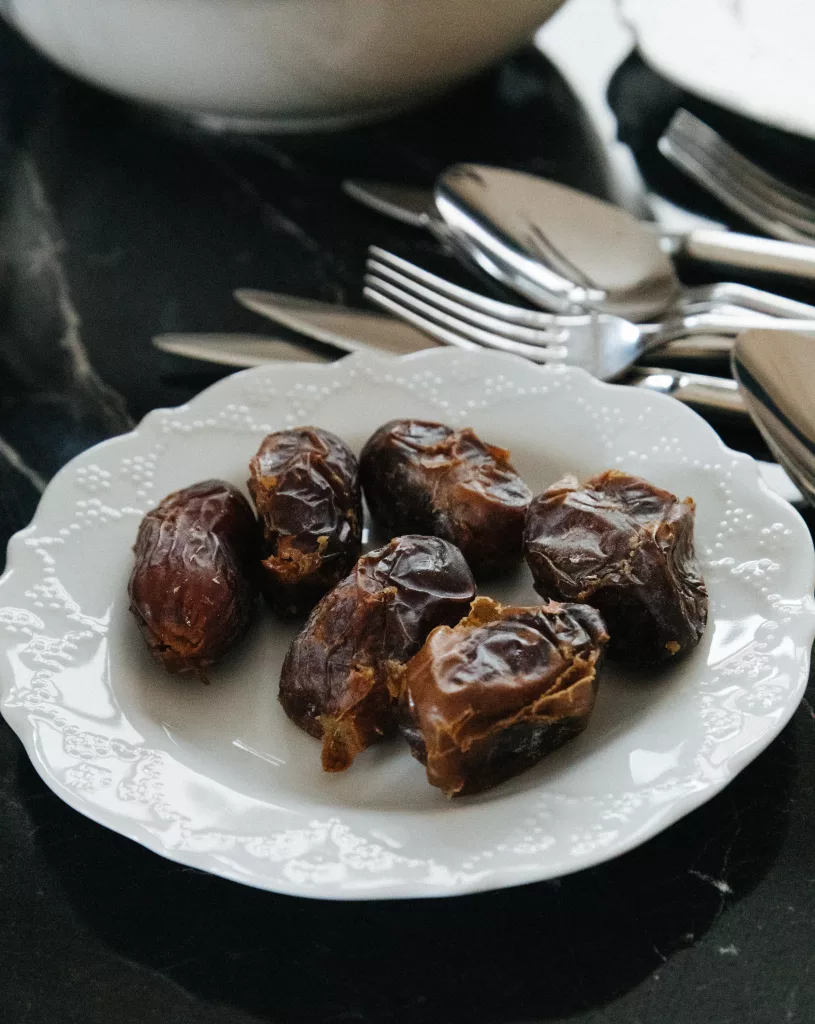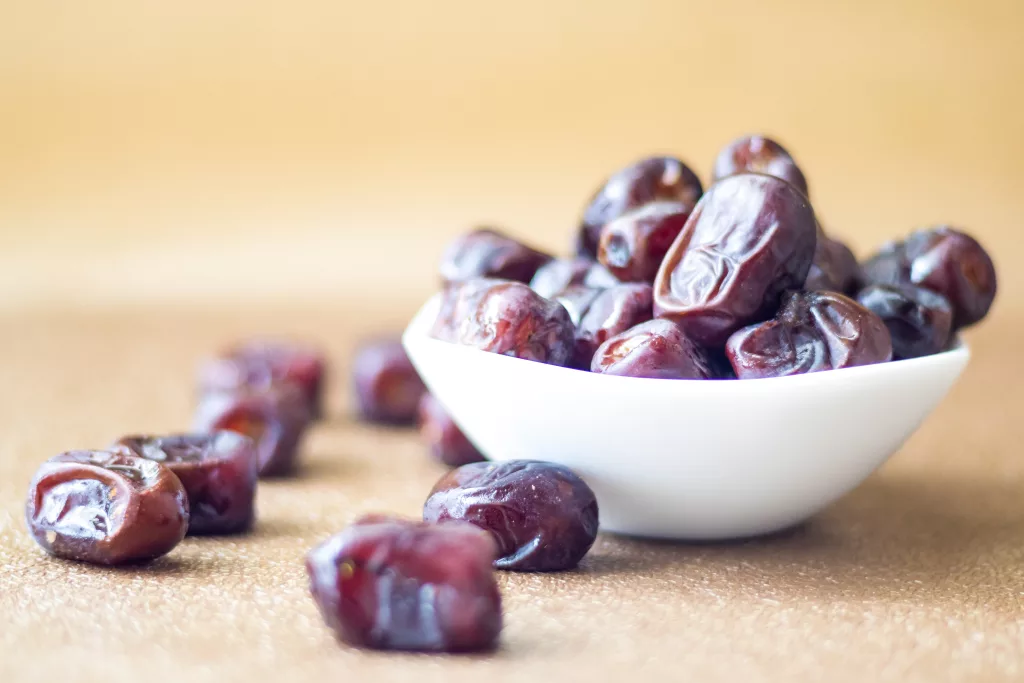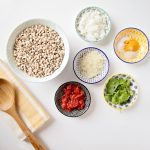When it comes to healthy eating, one food that often gets overlooked is the humble date. Originating from the Middle East, dates have been consumed for centuries not only for their rich, sweet flavor but also for their numerous health benefits. Packed with essential nutrients and a wide array of medicinal properties, dates are a delicious and versatile fruit that can enhance your overall well-being.
In this blog post, we will explore some of the incredible health benefits of dates has to offer, its nutritional value and origin.

Table of Contents
Dates’ Origin
Dates have a long and rich history that dates back thousands of years. They are believed to have originated in the region known as the Fertile Crescent, which includes modern-day Iraq and Egypt. The date palm, scientifically known as Phoenix dactylifera, is the tree that produces dates.
The cultivation of dates can be traced back to ancient Mesopotamia (present-day Iraq), where they were highly valued for their nutritional and medicinal properties. The ancient Egyptians also revered dates and considered them a symbol of fertility and abundance. They were a staple food in their diet and were used in various culinary preparations.
In summary, dates originated in the region of the Fertile Crescent and have a rich history spanning thousands of years. They have been cultivated and cherished for their nutritional value, and their cultivation has spread to various parts of the world, particularly in arid and desert regions. Today, dates continue to be enjoyed as a delicious and versatile fruit with both historical and cultural significance.
Oldest Known Seed to Successfully Germinate: In 2005, an ancient seed was discovered during an archaeological excavation in Israel. The seed was estimated to be around 2,000 years old and belonged to the extinct Judean date palm variety. Scientists decided to give it a chance and successfully managed to germinate the seed, leading to the growth of a new palm tree. This event marked the oldest known seed to successfully sprout into a viable plant.
#funfacts
Nutritional Value of Dates

Dates are not only delicious but also packed with essential nutrients that contribute to overall health and well-being. Here is a breakdown of the nutritional value of dates per 100 grams (approximately 3.5 ounces):
- Calories: Dates are energy-dense fruits, providing around 277 calories. While they are relatively high in calories, they offer a range of other valuable nutrients.
- Carbohydrates: Dates are predominantly composed of carbohydrates, making them an excellent source of energy. They contain about 75 grams of carbohydrates per 100 grams, primarily in the form of natural sugars like fructose and glucose.
- Fiber: Dates are rich in dietary fiber, with approximately 7 grams per 100 grams. Fiber aids in digestion, promotes a healthy gut, and helps regulate bowel movements, preventing constipation.
- Potassium: Dates are a good source of potassium, containing around 696 milligrams per 100 grams. Potassium plays a vital role in maintaining proper heart function, regulating blood pressure, and supporting overall nerve and muscle health.
- Magnesium: Dates are a decent source of magnesium, providing approximately 54 milligrams per 100 grams. Magnesium is essential for various bodily functions, including energy production, muscle function, and bone health.
- Vitamin B6: Dates are a notable source of vitamin B6, with around 0.25 milligrams per 100 grams. Vitamin B6 is involved in brain development and function, as well as the production of red blood cells and neurotransmitters.
- Iron: Dates contain a moderate amount of iron, providing approximately 0.9 milligrams per 100 grams. Iron is necessary for the production of red blood cells and the transportation of oxygen throughout the body.
- Calcium: Dates contain a small amount of calcium, contributing around 64 milligrams per 100 grams. Calcium is essential for maintaining strong bones and teeth.
- Vitamin K: Dates offer a modest amount of vitamin K, with approximately 2.7 micrograms per 100 grams. Vitamin K is important for blood clotting and bone health.
- Antioxidants: Dates are rich in various antioxidants, including flavonoids and phenolic compounds. These antioxidants help neutralize harmful free radicals in the body and protect against cellular damage.
It’s important to note that the nutritional content may vary slightly depending on the variety and ripeness of the dates. However, overall, dates are a nutrient-dense fruit that provides a range of valuable vitamins, minerals, fiber, and antioxidants, making them a healthy addition to a balanced diet.
Here Are Some Amazing Health Benefits of Dates

1. Nutrient Powerhouse:
Dates are small but mighty when it comes to their nutritional profile. They are an excellent source of fiber, which aids in digestion and promotes a healthy gut. Additionally, dates contain essential minerals such as potassium, magnesium, and manganese, which are vital for maintaining proper bodily functions. They are also rich in vitamins B6 and K, providing a natural boost to your immune system and supporting bone health.
2. Improved Digestion:
If you suffer from digestive issues such as constipation, dates may be your new best friend. The high fiber content in dates helps regulate bowel movements and prevents constipation. Furthermore, dates contain natural sugars like fructose and glucose, which are easily digested and provide a quick energy boost. Consuming dates regularly can contribute to a healthy digestive system and alleviate discomfort.
3. Heart Health:
Maintaining a healthy heart is crucial for overall well-being, and dates can play a significant role in promoting cardiovascular health. Studies have shown that dates can help lower LDL (bad) cholesterol levels while increasing HDL (good) cholesterol. Additionally, their potassium content helps regulate blood pressure levels, reducing the risk of heart disease and stroke. The antioxidants present in dates also contribute to reducing inflammation and oxidative stress, further protecting the heart.
4. Energy Boost:
Dates have long been revered as an excellent natural energy source. Due to their high carbohydrate content, dates provide a quick and sustainable energy boost, making them an ideal snack for athletes and individuals engaged in physical activities. They are a healthier alternative to processed energy bars or sugary snacks, as they also provide essential minerals and vitamins.
5. Bone Health:
Strong and healthy bones are essential at every stage of life. Dates are a rich source of minerals like magnesium, calcium, and phosphorus, which are vital for maintaining bone density and preventing conditions like osteoporosis. Regular consumption of dates can help improve bone strength, especially when combined with other bone-friendly nutrients and a balanced diet.
6. Natural Sweetener
If you have a sweet tooth but want to avoid refined sugars, dates can be a perfect natural sweetener. They can be used in various culinary applications, such as smoothies, desserts, and baking, to add a touch of sweetness. Dates offer a healthier alternative to processed sugars while providing additional health benefits like fiber and essential nutrients.
Symbol of Life and Fertility: Dates have been revered as a symbol of life and fertility in various cultures throughout history. In ancient Egypt, dates were considered a symbol of prosperity, and their shape and color were associated with the human heart and blood. In Roman mythology, the date palm was associated with the goddess of love and beauty, Venus. Additionally, in some Middle Eastern traditions, dates are consumed by couples to enhance fertility and promote a healthy pregnancy.
#funfacts
The Bottom Line
Dates are a true nutritional powerhouse that deserves a place in your diet. From promoting digestion and heart health to providing natural energy and aiding bone strength, their health benefits are impressive. So, the next time you’re craving a sweet treat or looking for an energy boost, reach for a handful of dates and enjoy the tasty goodness while reaping their amazing health benefits. Embrace the power of dates and embark on a journey toward improved well-being.
Remember, like any food, moderation is key, as dates are calorie-dense. Consult with a healthcare professional or nutritionist to determine the appropriate portion sizes and ensure they fit into your overall dietary plan.
Did you find this helpful? Let us know in the comments.
You can also visit our Facebook and YouTube pages to know more about plants and their health benefits.
You might also like:
- The Wonderful Health Benefits of Lemon Balm: Nature’s Calming Herb
- The Miraculous Mimosa Tree: Unveiling Its Medicinal Uses and Origin
- 10 Effective Home Remedies for Heartburn Relief You Must Know
- What Do We Know About The Health Benefits of Prunes
- Understanding MS: 7 Signs And Symptoms of Multiple Sclerosis (MS)








